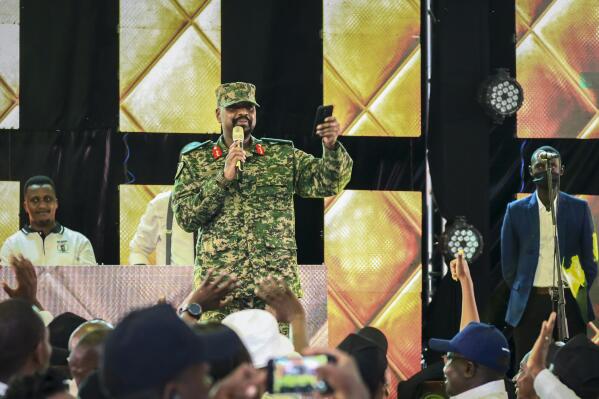Ugandan leader’s son unnerves with tweets of ambitions
KAMPALA, Uganda (AP) — On Twitter, the Ugandan president’s son has mused about invading neighboring Kenya, praised Russian President Vladimir Putin and offered cattle for the Italian prime minister’s hand in marriage.
While many of his tweets are dismissed as laughable, the ones about succeeding his father in this East African nation are a source of concern for some.
Many Ugandans want decisive political change after nearly four decades of the same government, but the son of President Yoweri Museveni is already claiming victory. “I will be President of Uganda after my father,” Muhoozi Kainerugaba tweeted earlier this month. “Those fighting the truth will be very disappointed!!!”
Museveni, 78 and in power for 37 years, hasn’t said when he will leave office. Kainerugaba is at the peak of his military career as a four-star general who is a linchpin of the security apparatus supporting Museveni.
But at 48, Kainerugaba is now six years older than his father was when he became president, underscoring what some see as the root of his increasingly impatient claim to the presidency. With his tweets — which Ugandans try to decode for signs of what’s coming — he has injected a measure of intrigue in politics midway through Museveni’s sixth elected term.
Does Kainerugaba, described by some Ugandans as the “standby generator,” have a legitimate path to the presidency? Or will he take matters into his own hands?
“If even the son could no longer bear his father’s endless rule, why should others tolerate it?” asked columnist Alan Tacca, writing in the Daily Monitor newspaper. “Right now, many of his supporters and professional opportunists seem unsure which way to jump.”
Kainerugaba has staged rallies in the past year that he says are to introduce him to youth across the country, even though serving army officers are legally barred from engaging in partisan affairs. He also has attacked the ruling party, led by his father, as a “reactionary” group full of corrupt criminals.
The son’s verbal attacks have sparked a backlash, with the vice president saying Museveni will run again in 2026 and other officials asserting their faith in the president.
But tensions between Kainerugaba and some in the ruling party have promoted him as his own man, said Frank Gashumba, an entrepreneur and political analyst who is one of Kainerugaba’s most prominent supporters.
Gashumba spoke of Kainerugaba as an honest leader who would be intolerant of official corruption in the authoritarian style of Rwandan President Paul Kagame, who is often praised by Kainerugaba. “I see another Kagame,” he said, explaining why he believes some in the ruling party are unnerved. “I see he wants to bring in the iron hand.”
The president’s son could not be reached for an interview.
Kainerugaba, who is currently serving as a military adviser to his father, was born in neighboring Tanzania when Museveni was active in the clandestine struggle against Ugandan dictator Idi Amin. He attended boarding school in Uganda before receiving his military education in Britain and the U.S. He has never served in a civilian capacity.
His quick rise through the army ranks proved controversial over the years amid allegations of a secret project to groom him for the presidency. A purge in recent years of Museveni’s contemporaries in the military is widely seen as paving the path for Kainerugaba, whose perceived allies now control a wide range of military assets.
Museveni has said nothing publicly to disavow or encourage Kainerugaba’s political ambitions. But while celebrating the son’s birthday last year, he warned that while he was patient with corrupt officials, this was not the case with Kainerugaba. “He will fight corruption,” said Museveni. The comment was seen as a sign that Museveni sees Kainerugaba as Uganda’s future leader.
But many have doubts about the president’s son.
Those who know him say he is impulsive, citing his comments on Twitter. Museveni once had to apologize to Kenya for a tweet that said Uganda’s forces could take its capital, Nairobi, in two weeks. Museveni then removed Kainerugaba as infantry commander even as he promoted him to the highest military rank. Despite the rare public rebuke of his son, Museveni cited “many other positive contributions the general has made and can still make.”
Yet Kainerugaba continues to tweet provocatively. “In the cannibalistic politics of NRM, let me say this, those who fight my father, fight me and those who fight me, fight my father,” he tweeted in January, speaking of the ruling party.
Kainerugaba also has faced charges of rights abuses in relation to his previous role as commander of Uganda’s special forces. Opposition figure Bobi Wine has said he and some supporters have been victimized by the special forces, and a satirical writer now exiled in Europe accused Kainerugaba of ordering his torture while in detention. The special forces deny these allegations.
Others criticize Kainerugaba for his lack of political charm, saying he is a pure soldier while his father has a folksy style.
And while Museveni imbibed Marxism and as a college student sought to verify Frantz Fanon’s theory of violence, Kainerugaba has not outlined his political vision. He sometimes makes a spiritual claim to leadership as a presumed heir to the line of an ancient dynasty of cattle keepers known as the Bacwezi.
He is yet to craft a compelling argument for why he should be supported, said Yusuf Serunkuma, a political theorist. And yet Serunkuma has argued that a coup by Kainerugaba would be celebrated by many Ugandans.
“Coups are back on the African continent, and they are popular,” he said. “The best chance by far for him is to take power when his dad is still alive.”




